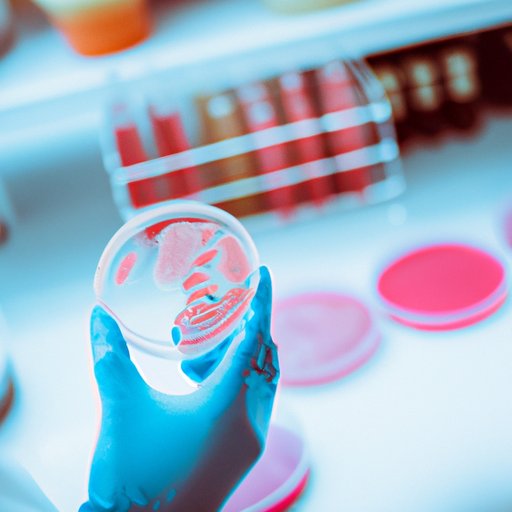Introduction
Microbiology is the study of microorganisms, including bacteria, viruses, fungi, protozoa, and algae. It has become an increasingly important field of scientific research, as it provides insights into the role of microbes in biological systems. On the other hand, biological science is the broad study of life and living organisms, including their structure, function, growth, evolution, distribution, and taxonomy. This article will explore the relationship between these two fields, examining how microbiology plays an essential role in advancing biological science.

An Overview of Microbiology and its Place in Biological Science
At first glance, it may seem that microbiology and biological science are separate disciplines. However, they are deeply intertwined. In fact, many biologists use microbiology techniques to investigate the role of microorganisms in biological systems. For example, researchers have used advanced microscopy techniques to observe the behavior of individual cells and better understand how they interact with each other. Additionally, molecular biology techniques such as DNA sequencing are often used to identify and classify microorganisms.
In addition to providing tools for studying the role of microorganisms in biological systems, microbiology has also made significant contributions to our understanding of how biological systems work. In particular, researchers have used microbial models to investigate topics such as gene expression, protein synthesis, and cell signaling. By studying the interactions between microbes and their environment, scientists can gain valuable insight into the functioning of biological systems.

Examining the Significance of Microbes to Understanding Biological Systems
Microbes play an essential role in understanding biological systems. For instance, microbes have been shown to have an important impact on the environment. They are responsible for the cycling of nutrients, which is essential for the functioning of ecosystems. Similarly, microbes are involved in processes such as nitrogen fixation, which helps maintain soil fertility and promote plant growth.
In addition, microbes play an important role in human health. For example, beneficial bacteria help protect the human gut from pathogens and aid digestion. Similarly, certain types of bacteria can help reduce inflammation and improve immunity. Finally, microbes are also involved in the production of antibiotics, which are essential for treating infections caused by pathogenic bacteria.
The Impact of Microbiology on Modern Biological Research
The advances made in microbiology over the past few decades have had a profound impact on modern biological research. Thanks to improved techniques such as genetic engineering and high-throughput sequencing, researchers now have access to powerful tools for studying microorganisms. As a result, scientists have been able to make significant progress in areas such as infectious disease research, drug development, and environmental conservation.
For example, researchers have used genetic engineering to develop new vaccines and treatments for diseases caused by viruses and bacteria. Additionally, scientists have used high-throughput sequencing to identify and classify previously unknown microorganisms. Finally, researchers have used microbial models to gain insights into the functioning of biological systems.
Conclusion
In conclusion, microbiology and biological science are closely linked. Microbes play an essential role in understanding biological systems and advancing modern research. Through the use of advanced techniques such as genetic engineering and high-throughput sequencing, researchers have been able to make significant progress in areas such as infectious disease research, drug development, and environmental conservation. Therefore, it is clear that microbiology is an important and integral part of biological science.
(Note: Is this article not meeting your expectations? Do you have knowledge or insights to share? Unlock new opportunities and expand your reach by joining our authors team. Click Registration to join us and share your expertise with our readers.)
